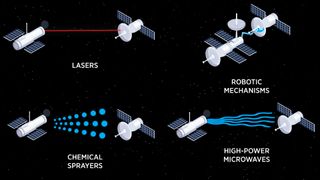DARPA wants new ideas for space weapons
The U.S. Department of Defense wants fresh ideas on how to maintain military superiority in space.

The Pentagon's Defense Advanced Research Projects Agency (DARPA) wants small companies to help it find new ways to project U.S. military power in space.
DARPA, an agency within the U.S. Department of Defense (DoD) tasked with researching and developing new technologies, issued a statement outlining how it wants private companies outside of the typical base of legacy defense contractors to submit ideas related to "space superiority." The U.S. Air Force defines space superiority as "the degree of control in space of one force over any others that permits the conduct of its operations at a given time and place without prohibitive interference from terrestrial or space-based threats."
In other words, DARPA wants ideas for new space-based weaponry that can defend U.S. satellites from being damaged or disrupted by adversary systems, as well as systems that can carry out their own attacks.
Specifically, DARPA wants companies to submit ideas about "new methods and technologies that may provide warfighters with disruptive options for protecting and defending space systems." The solicitation is part of the agency's Bringing Classified Innovation to Defense and Government Systems (BRIDGES) initiative, which seeks to connect innovative companies with government agencies in order to solve "challenging problems that exist in the classified realm," according to DARPA's statement.
Related: US Space Force wants private companies to help it counter 'emerging threats' in space
The U.S. Space Force document "Space Doctrine Note: Operations" published in 2022 outlines how space superiority can be achieved through both defensive and offensive operations. Defensive operations are those that protect the United States' space-based capabilities from adversaries' anti-satellite or counterspace systems, while offensive operations are those that "include actions to deceive, disrupt, deny, degrade or destroy the adversary's military space capabilities."
This could include a wide range of concepts, from ground-launched direct-ascent missiles designed to destroy satellites, to space-based lasers designed to blind the optics on adversaries' satellites. Other approaches include radiofrequency jamming, cyberattacks on ground stations, ground-based lasers aimed at satellites overhead, orbital projectile weapons and even more exotic concepts such as space-based chemical sprayers.
Get the Space.com Newsletter
Breaking space news, the latest updates on rocket launches, skywatching events and more!

As space becomes ever more contested by the world's military superpowers, a new space race is brewing, one centered on denying one's adversaries the free use of space and the satellites that call it home. But as in the case of spaceflight, private industry is currently moving faster than government agencies when it comes to developing the latest technologies.
According to DARPA's official solicitation documents, most of the existing programs related to space superiority "do not incorporate the latest innovations from the booming commercial 'new space' industry," slowing down the DoD's ability to field emerging technologies.
That same sentiment was echoed by DARPA leadership in this solicitation. "Tremendous innovation is happening in the commercial space industry, yet long procurement timelines and a relatively small number of cleared companies can limit adoption of those new innovations in defense and government space initiatives," Air Force Maj. Michael "Orbit" Nayak, program manager in DARPA's Strategic Technology Office, said in DARPA's statement. "This means that potentially revolutionary concepts for space-based national security technology go untapped.
"We're looking to flip that script, so that innovators who can provide the best ideas for the many unanswered questions and unique potential of the space domain have a seat at the table," Nayak continued. "We want to find solutions we didn't even know we needed to establish and maintain superiority in space."
The U.S. Space Force recently opened an office with the same goal in mind. The service's new Commercial Space Marketplace for Innovation and Collaboration office, or COSMIC, aims to partner with the private sector in order to acquire new technologies more quickly.
Interested companies have until Oct. 1, 2023 to submit their space superiority ideas to DARPA. The agency will continue to evaluate proposals through March 2024.
Join our Space Forums to keep talking space on the latest missions, night sky and more! And if you have a news tip, correction or comment, let us know at: community@space.com.

Brett is curious about emerging aerospace technologies, alternative launch concepts, military space developments and uncrewed aircraft systems. Brett's work has appeared on Scientific American, The War Zone, Popular Science, the History Channel, Science Discovery and more. Brett has English degrees from Clemson University and the University of North Carolina at Charlotte. In his free time, Brett enjoys skywatching throughout the dark skies of the Appalachian mountains.
